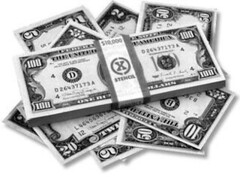 Does anyone else out there in America think this is long overdue?
Does anyone else out there in America think this is long overdue?
More than 650 economists, including five winners of the Nobel Prize for economics, called Wednesday for an increase in the minimum wage, saying the value of the last increase, in 1997, has been "fully eroded."
Critics claim that most people who earn minimum wage are teenagers with after-school jobs, but this is just not true. However, even if this were true, I don't think this is a valid argument against paying fair wages.
The economists wrote, "While controversy about the precise employment effects of the minimum wage continues, research has shown that most of the beneficiaries are adults, most are female, and the vast majority are members of low-income working families."
I think it is absolutely shameful that, in this nation of abundance, there are people who work full-time who are unable to fully support themselves and their families.

"Does anyone else out there in America think this is long overdue?"
Hell, yes!
I don't directly oppose the idea of minimum wage, especially in a high unemployment situation, but I tend to view it as a dirty band-aid fix.
Yeah, it's not acceptable that companies operate paying their employees less than they need to live on, but the reason they can is that we are not churning out enough well prepared adults into the workforce, percentage wise, making cheap labor scarce enough to drive up the minimum wage naturally.
(I originally placed education in the hot seat, but changed it as on reflection the fault lies with society as a whole, not just the educational system).
Brian: The problem is that overhauling the entire system isn't particularly practical -- even if all factors were accessible to law, "opening the question" for many of the issues involved would simply expose them to further manipulation by (only) the most powerful players. This is actually happening w.r.t. the educational system(s), as for example, NCLB's replacement of detailed accountability with restrictive and simplistic mandates, or the attempts to defund the public systems by way of "vouchers" and such.
The minimum wage acts as a limiting peg for a particularly important dynamic balance within that system. Use of such limits is a classic way way to manipulate complex systems such as the economy, without setting off a feeding frenzy over exploitation of new funding streams.
Having witnessed a few teenagers who, for one reason or another, had to try to hold down an apartment, and finish high-school solely on the pay from such jobs, I feel this critique is functionally indistinguishable from advocating abuse of teenagers.
Alas, another socialist agenda item that screws up the economy. Yes, it is sad that not everybody can command a better wage. God isn't nice, for some value of God. Nonetheless, the whole concept of a "minimum wage" is broken as designed.
A minimum wage ripples through the whole economy upsetting natural systems, pegging a bottom on some wages. The bottom peg hurts more than helps those it intends to help the most. Employers simply figure out ways not to hire more people in order to keep the labor costs low. The result is a higher tax (the effect of an artificial price control) burden on the productive members of society. This, in turn, drives up the price of the productive members' wage demands; because the productive members' have a sellers market to sell to, the consequence of the minimum wage is a disproportionate rise in labor costs to business. At the same time, the artificial peg at the low end of the labor market, the real effective wage at the low end, for those who actually can get a minimum wage job, falls disproportionately. Finally, an increase in the minimum wage increases the cost of US production with respect to the cost of production in other countries, further eroding the US's competitiveness in world markets.
The USA is no longer the tail that wags the dog. At 3.0*10**8 population vs. PRC's 2*10**9, the USA has approximately 5 percent of PRC's population. Relative numbers count. Consider too that the PRC is the fastest growing economy in the world. We [the USA] are at a distinct economic disadvantage in world markets. The minimum wage is one of the contributing factors that will make us a third-world economy all too soon if it is not reduced or eliminated all together.
So, no, its not time for an increase in the minimum wage. Its time to eliminate it.
Britain has a minimum wage whose purchasing power is equivalent to $8 US, and an unemployment rate lower than the USA's. Ireland, the fastest growing economy in Western Europe, has a minimum wage about equivalent to $8 as well and an unemployment rate barely above 4%.
Economies are "natural systems?" Heh, that's teh funny.
Economies ARE natural systems.
Economics is a subset of ecology, and to the extent that people interfere in the natural workings of economies they fail, the same way ecologies fail when people interfere in them.